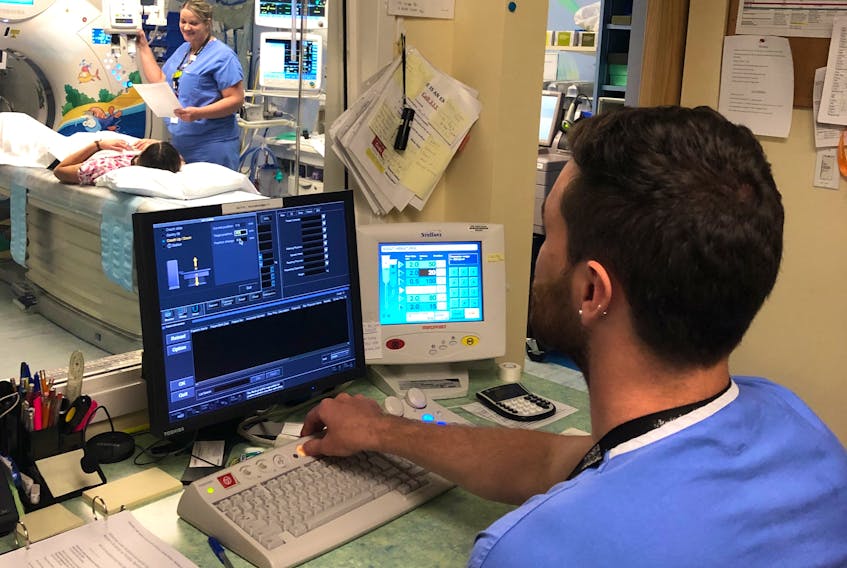Inside the radiation therapy waiting room at the Health Sciences Centre, a couple of people are quietly working on a partially completed jigsaw puzzle of a picturesque cobblestoned European village.

In a corner, a woman is knitting a block that will get tossed into a box with other squares that will eventually be made into a quilt for a cancer patient.
A couple of men drink coffee and watch the TV news.
Couples chat good-naturedly about the inconvenience of having to travel from Labrador or the Northern Peninsula to spend months in St. John’s while they’re undergoing treatments that last only about 15 minutes a day. A couple from central Newfoundland says at least they can go home for the weekends.
“I can get my wood in for the winter, and all that,” a man says.
If you’re from the St. John’s area, you can go to the hospital, have radiation and be back in your car in minutes, for a total cost of 50 cents for parking.
And before any of that — and this is a real scenario — you’ve already seen your family doctor, had blood tests, physical exams, a biopsy, medical scans, consults with a surgeon, surgery, a blood transfusion, multiple days of recovery in hospital (where you were medicated and fed), given supplies for home recuperation, had visits with a community nurse, consults with an oncologist, a nurse practitioner and a lymphatic nurse, and then 33 courses of radiation over seven weeks. Price tag? Whatever you paid for parking.
And, remember, that’s just for one health-care issue in your lifetime.
Canada’s health care system is not perfect.
There are gaps. Dental health, for example, can cost you plenty. Ditto for certain vital medications, even if you have insurance.
If the procedure you need is not performed here, you may have to undertake expensive travel and accommodation to get it. There can be long wait times for certain surgeries.
Urban centres offer more services than places that are further flung.
A serious illness may force you to take unpaid leave from work if you don’t have a good benefits plan — or even lose your job.
Mistakes are occasionally made.
So, medicare’s not perfect, no.
But when you consider the alternative, it really makes you appreciate what we have.
In the United States, there’s a name for what happens when illness has a devastating effect on your finances.
Almost half of new cancer patients in the U.S. will go on to lose their entire life savings.
The American Journal of Medicine defines “Financial toxicity” as the unintended financial consequences of medical treatment.
That means, for our neighbours to the south, cancer can wreak havoc in ways beyond the physical and emotional that people might not even imagine, let alone be able to plan and budget for.
Almost half of new cancer patients in the U.S. will go on to lose their entire life savings.
That’s according to an October 2018 study by the American Journal of Medicine titled “Death or Debt? National Estimates of Financial Toxicity in Persons with Newly-Diagnosed Cancer.”
In February, National Public Radio (NPR) in the U.S. used that study as a springboard for an in-depth article about the high cost of cancer, interviewing Carol Marley, a hospital nurse with pancreatic cancer from Round Rock, Texas.
Unable to work because of her illness, Marley was spending her days trying to reconcile medical bills between insurance companies and pharmacies. An MRI bill for $870, for example, was rejected because there had been no pre-authorization. A bill for chemo was $18,400.
The couple paid out more than $10,000 in less than six months after Carol’s diagnosis.
She had decent insurance, but said the stress of worrying about her family’s finances in addition to her own health and mortality was almost too much to bear.
NPR reported that Carol and her husband “were hoping to retire early, buy an RV and drive around the country. Instead, they see their meticulous plans disappearing, even if Carol recovers.”
Carol Marley died Nov. 14, age 51.
Cancer is painful and terrifying enough, without having to worry about losing everything your family owns.
That’s worth considering if you get tangled up in road rage over something as simple as the traffic-snarled parking lot of the Health Sciences Centre.
Pam Frampton is The Telegram’s managing editor. Email [email protected]. Twitter: pam_frampton
MORE FROM PAM FRAMPTON









